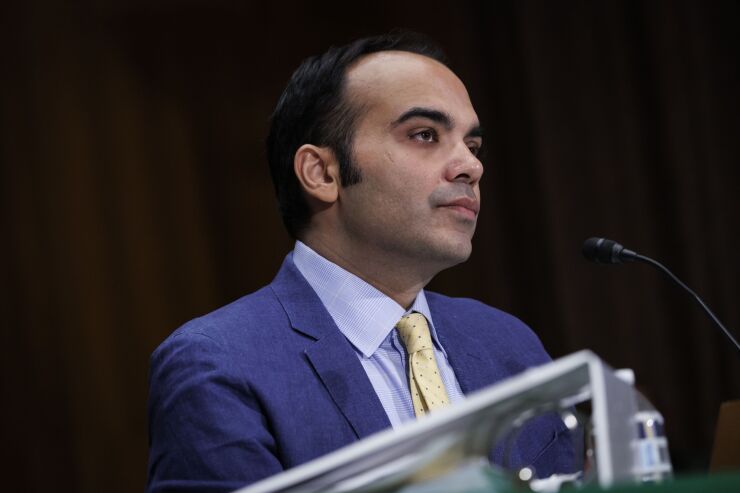
The Consumer Financial Protection Bureau issued a warning that money stored on digital payment apps may not be safe in the event of financial distress because the funds are not held in accounts with federal deposit insurance coverage.
The CFPB published a
The CFPB said consumers may need to take action to move their balances stored in payment apps.
"Popular digital payment apps are increasingly used as substitutes for a traditional bank or credit union account but lack the same protections to ensure that funds are safe," CFPB director Rohit Chopra said in a
Chopra has long warned about increased fraud, and the safety and security of customer funds on digital payment apps. In April, Chopra suggested on a
Last year, the agency
Payment apps allow users to quickly pay retailers and others, while providing the option to store funds. But the CFPB said that the bank liquidity crisis in March reminded many Americans that funds deposited with banks and credit unions "enjoy the safety afforded by federal deposit insurance through the Federal Deposit Insurance Corp. or National Credit Union Administration.
"Americans witnessed the failure of large systemically important banks such as Silicon Valley Bank, Signature Bank, and First Republic Bank," the bureau said in a press release. "These banks experienced a run, but insured depositors could have confidence their money was safe. However, similar protection would not be guaranteed to customers that store money on nonbank payment apps."
The CFPB said an estimated $893 billion in transactions were conducted on payment apps across all service providers with the amount expected to double by 2027 to an estimated $1.6 trillion. The vast majority of consumers using digital payment apps are between the ages of 18 and 29, the bureau said.
Consumer Financial Protection Bureau director Rohit Chopra said the systemically important financial institution designation should be considered for platforms such as PayPal, Venmo and Cash App.
Nonbank digital payment apps earn money through fees on merchants and other ancillary services such as selling crypto-assets and offering affiliated financial products. They also earn money when users store funds on their platforms, and "do not necessarily store customer funds in an insured account through a business arrangement with a bank or credit union," the CFPB said.
"Companies hold and invest the funds," the bureau said. "The company's investments carry risk and if it were to fail, customers could lose their funds. These activities are not typically subjected to the same oversight that an insured bank or credit union faces."
In addition, user agreements for digital payment apps typically lack specific information on where funds are being held or invested, whether and under what conditions they may be insured and what would happen if the company or the entity holding the funds were to fail, the CFPB said.
The CFPB said that state laws generally do not require that customer funds be stored in or automatically swept into insured accounts. The CFPB said it will continue coordinating with state and federal regulators to monitor payments apps.






